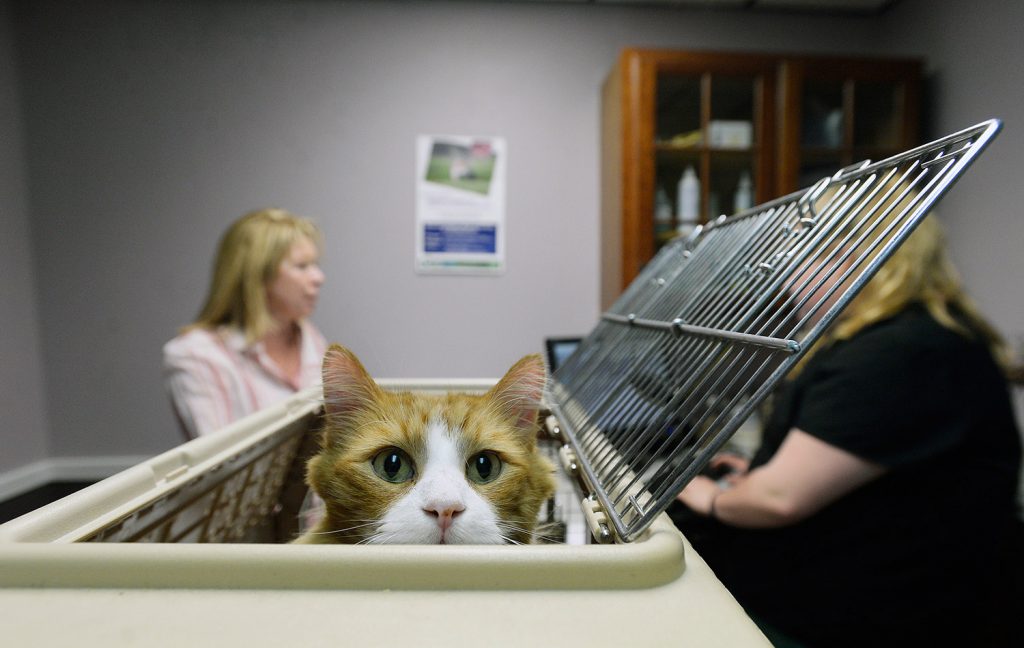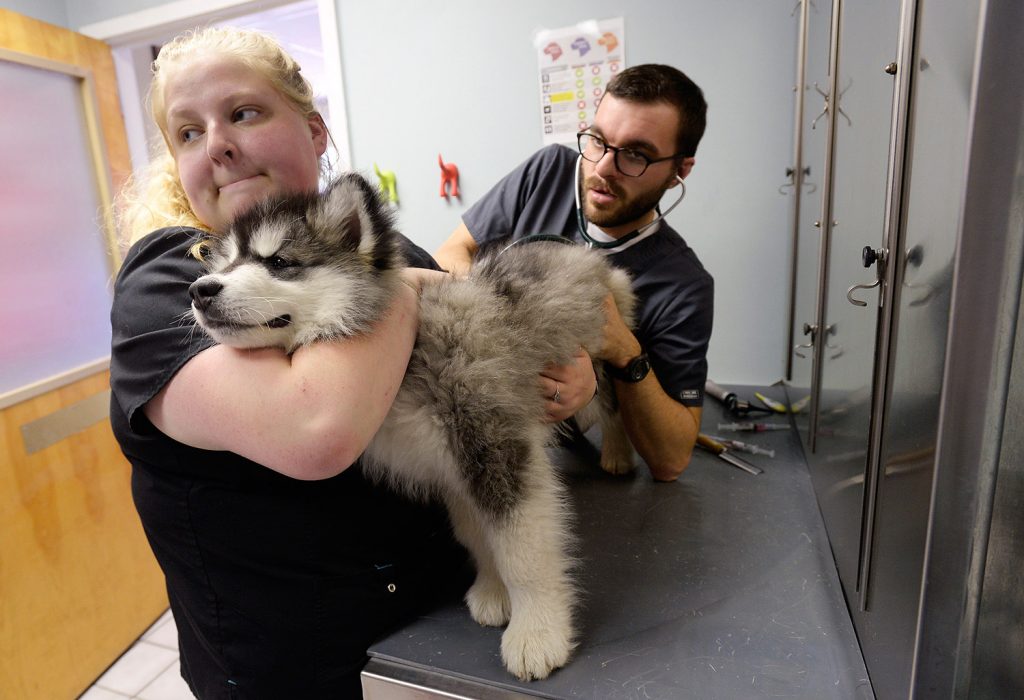
ImmuCell Inc. President and CEO Michael Brigham would like to see the Portland area’s animal health sector develop the sort of industry clout that exists in Kansas City, which recently tried to lure his company’s new factory away from Maine with a raft of economic incentives.

Brigham ultimately decided not to take the offer for logistical reasons, but he said the experience impressed upon him the advantages of having a large cluster of similar businesses in the same metro area.
“It’s called the KC Animal Health Corridor – most major animal health companies in the world are either headquartered there or have significant operations there,” said Brigham, whose Portland-based company produces bovine health products for the beef and dairy industries. “They were giving away land, they were giving away tax credits, there’s an industry group that was treating us with the red carpet and trying to recruit us to put our plant there.”
All told, Brigham said Immucell walked away from about $300,000 worth of free land, business tax incentives and job training programs, plus significantly lower utility costs and state income tax rates.
Leaders of Portland-area animal health companies said they see the beginnings of an industry cluster in southern Maine that could provide a tremendous boost to their businesses and the state’s economy.
But Portland is a long way from becoming like Kansas City, home to over 300 animal health companies representing more than 50 percent of total worldwide animal health, diagnostics and pet food sales, according to the KC Animal Health Corridor website. The city also hosts two world-class veterinary schools that provide a constant flow of new blood.
While the Portland area has only a handful of major animal health companies and no veterinary school, it has begun to distinguish itself as a regional destination for companies and workers in the industry that thrives on consumers’ desire to keep their animals happy and healthy. In 2017, Americans spent about $70 billion on their pets, including $32 billion on veterinary care, medicine and supplies, according to a leading industry group.
“Maine’s never going to get as big as the KC Animal Health Corridor, but if we had even some small growth in that direction, it’s very valuable,” Brigham said. “Just the collaboration on things that aren’t competitive, and the increase in the (worker) pool is really No. 1 to me.”

INDUSTRY CLUSTER BENEFITS ALL MEMBERS
The animal health industry has been expanding rapidly in southern Maine with major new developments such as a $62 million expansion for Idexx Laboratories Inc. in Westbrook, the 2016 acquisition of Portland pet pharmaceuticals maker Putney Inc. by British veterinary products manufacturer Dechra Pharmaceuticals PLC, the recent completion of ImmuCell’s new $20 million production facility, and a planned merger and public offering for veterinary tech firm Vets First Choice, which is also building a $20 million headquarters in Portland.
If the Vets First merger with a spinoff of global health care products and services provider Henry Schein Inc. goes through as planned by the end of this year, Maine will have three publicly traded companies in the animal health sector: Vets First, Idexx and ImmuCell.
Like the rising tide that lifts all boats, an industry cluster benefits all of its member companies by creating opportunities for collaboration and competition, job security for workers, a flowing pipeline of talent to employers, political clout to influence policy, and the marketing muscle to lure even more industry players.
In 2011, animal health industry leaders in and around Kansas City recognized the benefits of pooling their resources to fund a collaborative organization that would promote the industry cluster, said Kimberly Young, president of the KC Animal Health Corridor.
The initiative, created and funded by private industry with cooperation from state and local governments and academic institutions, is designed to promote workforce development and innovation within the industry along with favorable public policy, Young said. The initiative also does marketing and recruits animal health businesses in other states and countries to relocate or expand to the corridor, which straddles Missouri and Kansas and encompasses 22 counties, she said.

Between the two states and the many cities and towns in the area, the corridor is able to offer businesses such as ImmuCell a variety of incentives, such as tax breaks, subsidies for workforce training, forgivable loans and even free land in some communities, she said.
‘WE CHOOSE TO STAY IN PORTLAND’
Mike Eldred is president of North American operations for Dechra Pharmaceuticals, which acquired Putney in March 2016 for $200 million. Eldred, who is based in Overland Park, Kansas, said he sees a bright future for the animal health industry in Portland, and for his company’s operations there.
“Since the start of 2018, we’ve hired eight new team members in Portland and 20 more across the U.S.,” Eldred said. “We plan to continue to invest and grow our business in the U.S., including Portland, where the majority of our inside sales and product development teams are based.”
The acquisition of Putney, which produces generic prescription drugs for pets, provided Dechra with a highly performing product development operation and a stream of quality, U.S. Food and Drug Administration-approved specialty drugs supporting the U.S. veterinary community, he said. Over the past two years, Dechra has integrated Putney’s commercial and inside sales functions into its U.S. operations. It has provided the British company, which is valued at nearly $4 billion, improved access to distribution and veterinary clinics in the U.S., helping to drive its growth, he said.
“Employee satisfaction is paramount among our goals as an organization,” Eldred said. “While we could likely operate our business anywhere – and we imagine the same is true for Idexx, Vet’s First Choice, and of course, ImmuCell, as well as many others – we choose to stay in Portland because we know this great city helps us attract and retain top talent.”
Eldred said people want to work in Portland because it’s safe, full of great restaurants and breweries, and offers a perfect combination of arts, outdoor recreation, and business and economic opportunities. For a small city, it hosts “big, forward-thinking companies” in addition to having an up-and-coming startup scene, he said, adding that the city’s location also is advantageous because it is fairly close to the Greater Boston area with access to Canada.
Like Brigham, Eldred believes that the presence of multiple animal health companies in Portland benefits all of them, including Dechra.
“Now, more than ever, success in the business world is dependent on connections and trusted relationships,” he said. “Two key members of our management team who are based in Portland have a combined 20-plus years with Idexx. We value their history and relationships within our industry.”
‘HERE, WE CREATE MARKET SHARE’
Idexx is by far the largest animal health company based in Maine, as well as the state’s largest publicly traded company in terms of annual revenue. It is currently ranked No. 961 on Fortune magazine’s list of the 1,000 largest U.S. publicly traded companies, based on its 2017 revenue of $1.97 billion.
The company has been expanding quickly in recent years, fueled by the growth in consumer demand for products and services that keep pets healthy. The company, which provides veterinary diagnostic testing products and services, added hundreds of jobs in 2017 and increased its revenue by 11 percent compared with the previous year.
“The secret that’s been there is the incredible, strong bond between people and their pets,” said Giovani Twigge, Idexx corporate vice president and chief human resources officer. “It’s generationally strong, and millennials are willing to spend more on this – that’s the opportunity.”
Idexx Executive Vice President Jay Mazelsky said the gradual promotion of pet dogs from the doghouse to the human house over the past few decades is just one example of how the bond between people and their pets has strengthened, which drives sales of products and services.
“A lot of people look at the pet as a beloved member of the household,” Mazelsky said. “In fact, when we do market research and ask pet owners about this, they say, in the majority of cases, ‘My dog sleeps in the bed with us.’ ”
Idexx spends a significant amount of its resources on research and development, Twigge said. By creating new products, companies such as Idexx actually generate new demand that didn’t exist before as consumers become aware of the availability of new animal health products and services.
“It’s an underserved industry,” he said. “In the human (health) market … they sort of fight for market share. Here, we create market share.”
As a result, there is room for every company in the animal health sector to grow, Twigge said, and the success of one business does not limit the fortunes of its competitors.
Industry statistics appear to support that claim. According to the American Pet Products Association, U.S. consumers spent nearly $70 billion on pet products and services in 2017, including food, supplies, medicine, veterinary care, grooming and boarding. A decade earlier, that figure was just over $40 billion.
SHARING RESOURCES
Idexx already has proven itself as an engine that drives the growth of southern Maine’s animal health cluster. For example, the cluster’s youngest rising star, Vets First, was conceived in 2009 by Idexx founder David Shaw, his then-wife, actress Glenn Close, and son Ben Shaw, who is the company’s CEO. The company provides a variety of technology services to veterinary clinics, including online pharmacy ordering and fulfillment.
Vets First announced in April that it plans to merge with the animal health division of existing public company Henry Schein, which then would be spun off as its own publicly traded corporation based in Portland. Vets First has about 800 employees and is one of the fastest-growing private companies in the U.S. with revenue growth of 378 percent from 2014 to 2016, according to Inc. magazine.
Brigham, the ImmuCell president and CEO, said the news about Vets First going public is a significant step forward for Portland’s animal health industry.
“I love having another company that’s generating a conversation like this, generating critical mass,” he said.
The presence of Idexx benefits southern Maine’s animal health industry in other ways, said Dr. David Gurzak, a veterinarian at Brackett Street Veterinary Clinic in Portland.
Idexx provides a variety of services to the local veterinary community, he said, including technical lectures, continuing education classes, diagnostic support services and career opportunities.
“We use Idexx for our diagnostic labs – I think most veterinary clinics in the area use Idexx,” Gurzak said. “We have a very close relationship with Idexx.”
In many ways, Portland still has a long way to go before it could be considered a major draw for the animal health industry, Brigham said.
Unlike Kansas City, it lacks any organized effort to bring together its constituent companies for collaboration or marketing purposes, he said. It also lacks the resources to offer prospective newcomers any significant economic incentives.
But as southern Maine’s animal health sector continues to grow, so will the benefits associated with it and the chances of organizing into something more powerful, he said.
“I just think in general, a cluster of specialization like that is good for everybody,” Brigham said. “The fact that we’re all in one community is beneficial to all, and the more, the better.”
J. Craig Anderson can be contacted at 791-6390 or at:
Twitter: jcraiganderson
Correction: This story was updated at 6:36 a.m. on May 25, 2018 to correct the first name of the CEO of Vets First Choice.

Comments are no longer available on this story